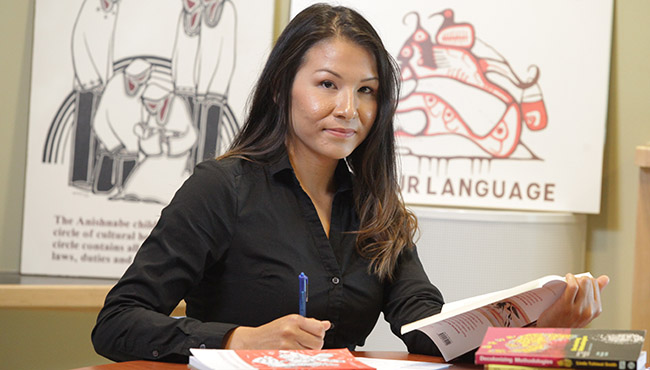Shawanda, university role model, path in education leads to a PhD

By Laura Young
SUDBURY – A stubborn streak and a love of theory-based learning are the unique combination keeping Amy Shawanda rooted to a path of education.
The indigenous studies master’s student at Laurentian University is one of 13 role models selected as part of the Council of Ontario Universities (COU) campaign: Let’s take our Future Further.
The campaign is designed to inspire aboriginal students to follow their dreams through education and finish their degrees.
The COU’s campaign honours the achievements of the chosen role models who, in turn, offer key messages and words of encouragement to current and future students.
Shawanda is a citizen of the Wikwemikong Unceded Indian Reserve on Manitoulin Island. She was recently accepted into the indigenous studies doctoral program at Trent University in Peterborough for the fall.
She will graduate with her master’s of indigenous relations this fall. She also has a double major in law and justice and indigenous studies from Laurentian University.
“It was an honour and a privilege in itself,” she says of her COU selection.
Her story is one of balancing school, trying to find the money to pay for it and being a single parent. She tells her story as part of her healing process.
“Knowing that I don’t have to cry anymore telling my story is empowering for me,” she reflected recently over tea at a busy Tim Hortons restaurant on the campus of Laurentian.
“I’m not the only one who goes through it. I’m just the one selected to talk publicly about it. I know a lot of my friends went through similar situations. A lot of single parents can relate.”
In her teens, Shawanda saw education as her ticket out of Northern Ontario. Her sister Karen has a master’s of social work. Her mother has a diploma in early childhood education and her sister Lindsay has a business administration diploma.
Education was part of the family tradition, then, but Amy Shawanda says she has still had to persevere through every obstacle thrown along her path.
At first, she was in Toronto, studying tourism at Humber College. When she realized it wasn’t for her, she took a job working at Casino Rama near Orillia.
Later pregnant with her son Brodie, now six, she decided she wanted to do something else. She was ready to study law and justice at college in Orillia but opted to move to Sudbury where there was more family support.
She credits a stubborn streak with keeping her feet moving forward.
“I think people have these expectations of me to fail, so hearing you’re not going to amount to anything . . ., your typical stereotypes. I was like, no.”
She has hoped to become a lawyer but, during her fourth year of her undergraduate degree, she changed directions.
It was a chance conversation about policy and a law career, with Justice Murray Sinclair, chair of the Truth and Reconciliation Commission, that helped focus her graduate-level studies.
As they talked policy, she mentioned that she wanted to change policy in a subtle way, she says. He told her that being a lawyer wouldn’t’ do that. “’What you actually want to do is a masters or a PhD.’”
She was initially saddened but found her way to Laurentian’s new indigenous relations master’s program. Her thesis examines the Anishinabae smudging ceremony in Northeastern Ontario health care facilities.
As for what’s next, she says she lives in the moment and sees where it takes her.
Links: https://www.youtube.com/watch?v=ZKypa50Q5aA&feature=youtu.be


